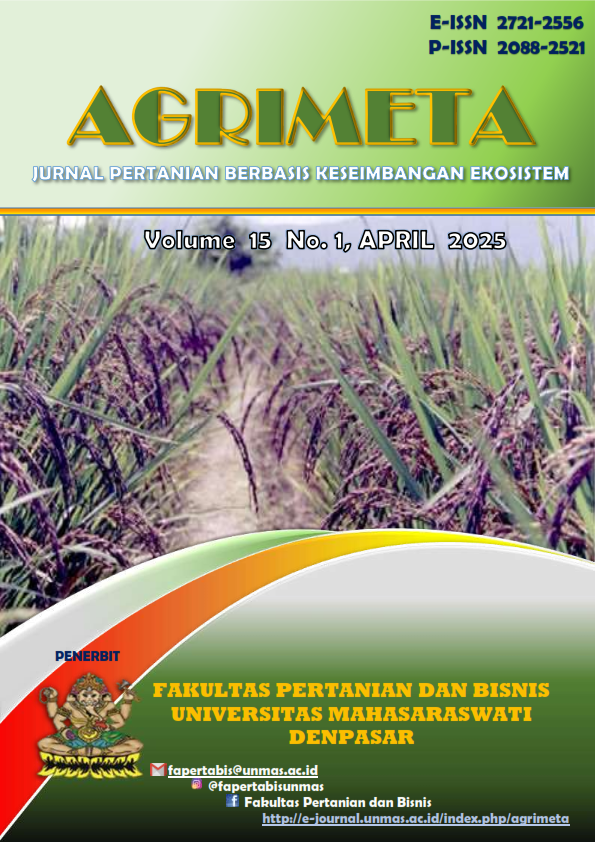DEVELOPMENT OF AGROTOURISM BASED ON LOCAL WISDOM IN BALI COUNTRYSIDE SIDEMEN AS AN EFFORT TOWARD SUSTAINABLE TOURISM
DOI:
https://doi.org/10.36733/agrimeta.v15i1.12598Keywords:
Agrotourism, Sustainable Agriculture, 4A Strategy, Village CollaborationAbstract
The Bali Countryside Sidemen area holds great potential to be developed as an agrotourism destination that combines the charm of rural landscapes, traditional farming practices, and the local wisdom of the community. Located in Sukahet Village, Sidemen District, Karangasem Regency, this area has the opportunity to become a model of sustainable agricultural tourism that supports food security, environmental education, and economic empowerment of local residents. However, the development of this destination still faces several challenges, such as limited promotion, inadequate tourism infrastructure, underdeveloped attractions, and poor accessibility. This study aims to formulate a development strategy for community-based agrotourism. A qualitative approach was used, involving interviews with five key informants consisting of tourism actors and local farmers, supported by documentation and direct field observation. The analysis was based on four key tourism elements (4A): attraction, accessibility, amenities, and ancillary services, with a focus on the agricultural context. The results show that strengthening promotion, creating educational attractions such as planting and harvesting activities, processing local agricultural products, and providing environmentally friendly accommodations rooted in farming culture are strategic steps to unlock the area’s potential. The main recommendation of this study is the collaboration between farmers, tourism entrepreneurs, and village government to establish an inclusive and sustainable agrotourism system.
Downloads
References
Asker, S., Boronyak, L., Carrard, N., & Paddon, M. (2010). Effective Community Based Tourism: A Best Practice Manual for Australia. Sustainable Tourism CRC.
Bank Indonesia. (2024). Laporan Perkembangan Ekonomi Bali Triwulan III. Jakarta: BI.
Barbieri, C., & Mshenga, P. M. (2008). The Role of the Firm and Owner Characteristics on the Performance of Agritourism Farms. Sociologia Ruralis, 48(2), 166–183.
Biantoro, A. (2014). Dampak Sosial-Ekonomi Pengembangan Pariwisata. Jurnal Kepariwisataan Indonesia, 8(2), 25–33.
BPS Bali. (2024). Statistik Pariwisata Provinsi Bali Tahun 2024. Denpasar: Badan Pusat Statistik Provinsi Bali.
Cooper, C., Fletcher, J., Fyall, A., Gilbert, D., & Wanhill, S. (2008). Tourism: Principles and Practice (4th ed.). Pearson Education.
Creswell, J. W. (2014). Research Design: Qualitative, Quantitative, and Mixed Methods Approaches (4th ed.). Sage Publications.
Dredge, D., & Jenkins, J. (2007). Tourism Planning and Policy. Brisbane: Wiley.
Farrell, B. H., & Twining-Ward, L. (2005). Seven Steps Towards Sustainability: Tourism in the Context of New Knowledge. Journal of Sustainable Tourism, 13(2), 109–122.
Gössling, S. (2002). Global Environmental Consequences of Tourism. Global Environmental Change, 12(4), 283–302.
Gössling, S., & Hall, C. M. (2021). Pandemics, Tourism and Global Change: A Rapid Assessment of COVID-19. Journal of Sustainable Tourism, 29(1), 1–20.
Gössling, S., & Hall, C. M. (2021). Tourism and Global Environmental Change: Ecological, Social, Economic and Political Interrelationships. Routledge.
Hernández-Mogollón, J. M., Duarte, A. M., & Folgado-Fernández, J. A. (2021). Agritourism and Sustainability: A Review of Developments and Trends in the Literature. Sustainability, 13(8), 4320.
Honey, M. (2008). Ecotourism and Sustainable Development: Who Owns Paradise? Island Press.
Lane, B. (2009). Thirty Years of Sustainable Tourism: Drivers, Progress, Problems and the Future. Journal of Sustainable Tourism, 17(1), 71–80.
Miles, M. B., Huberman, A. M., & Saldaña, J. (2014). Qualitative Data Analysis: A Methods Sourcebook (3rd ed.). Sage Publications. Murphy, P. E. (1985). Tourism: A Community Approach. Routledge.
Sugihartini, N., Sudarma, I. K., & Setiawan, I. B. (2021). Strategi Pengembangan Pariwisata Berbasis Partisipasi Masyarakat di Wilayah Timur Bali. Jurnal Ilmiah Pariwisata, 26(2), 142–155.
Timothy, D. J. (2007). Empowerment and Stakeholder Participation in Tourism Destination Communities. In D. G. Pearce & R. Butler (Eds.), Tourism Research: Critiques and Challenges (pp. 199–209). Channel View Publications.
Tosun, C. (2006). Expected Nature of Community Participation in Tourism Development. Tourism Management, 27(3), 493–504.
UNEP & WTO. (2005). Making Tourism More Sustainable: A Guide for Policy Makers. Paris and Madrid: UNEP and World Tourism Organization.
UNEP. (2011). Towards a Green Economy: Pathways to Sustainable Development and Poverty Eradication. United Nations Environment Programme.
UNWTO. (2005). Making Tourism More Sustainable: A Guide for Policy Makers. Madrid: World Tourism Organization.
UNWTO. (2019). Indicators of Sustainable Development for Tourism Destinations. Madrid: World Tourism Organization.
UNWTO. (2022). Tourism and Development Overview. Madrid: United Nations World Tourism Organization.
Wiranata, I. M., & Purnomo, H. (2022). Pengembangan Agrowisata Berbasis Lokal di Karangasem: Studi Potensi dan Kendala. Jurnal Agribisnis dan Pariwisata, 5(1), 33–45.
Downloads
Published
How to Cite
Issue
Section
License
Copyright (c) 2025 Anang Ma’rup, Ni Wayan Purnami Rusadi

This work is licensed under a Creative Commons Attribution-NonCommercial-ShareAlike 4.0 International License.






